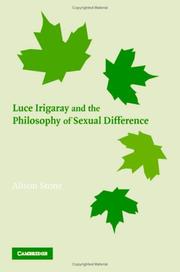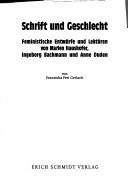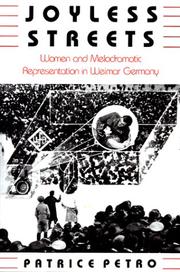| Listing 1 - 9 of 9 |
Sort by
|
Article
Abstract | Keywords | Export | Availability | Bookmark
 Loading...
Loading...Choose an application
- Reference Manager
- EndNote
- RefWorks (Direct export to RefWorks)
IRIGARAY (LUCE), 1932 --- -IRIGARAY (LUCE), 1932 --- -IRIGARAY (LUCE), 1932-
Article
Abstract | Keywords | Export | Availability | Bookmark
 Loading...
Loading...Choose an application
- Reference Manager
- EndNote
- RefWorks (Direct export to RefWorks)
Book
ISBN: 143847783X 1438477813 1438477821 9781438477831 9781438477817 9781438477824 Year: 2020 Publisher: New York : State University of New York Press,
Abstract | Keywords | Export | Availability | Bookmark
 Loading...
Loading...Choose an application
- Reference Manager
- EndNote
- RefWorks (Direct export to RefWorks)
Featuring a highly accessible essay from Irigaray herself, this volume explores her philosophy of life and living. Life-thinking, an important contemporary trend in philosophy and in women's and gender studies, stands in contrast to philosophy's traditional grounding in death, exemplified in the work of philosophers such as Socrates, Plato, and Schopenhauer. The contributors to Thinking Life with Luce Irigaray consider Irigaray's criticisms of the traditional Western philosophy of death, including its either-or dualisms and binary logic, as well as some of Irigaray's "solutions" for cultivating life. The book is comprehensive in its analyses of Irigaray's relationship to classical and contemporary philosophers, writers, and artists, and produces extremely fruitful intersections between Irigaray and figures as diverse as Homer and Plato; Alexis Wright, the First-Nations novelist of Australia; and twentieth-century French philosophers like Sartre, Badiou, Deleuze, and Guattari. It also develops Irigaray's relationship to the arts, with essays on theater, poetry, architecture, sculpture, and film.
Philosophy, Social Science. --- Irigaray, Luce. --- איריגארי, לוס --- Yiruigelai

ISBN: 2908855747 9782908855746 Year: 2003 Publisher: Paris: EPEL,
Abstract | Keywords | Export | Availability | Bookmark
 Loading...
Loading...Choose an application
- Reference Manager
- EndNote
- RefWorks (Direct export to RefWorks)
Antigone (Greek mythology) --- Kinship - Philosophy --- Feminist theory --- Hegel, Georg Wilhelm Friedrich, - 1770-1831 --- Irigaray, Luce --- Lacan, Jacques, - 1901-1981 --- Kinship

ISBN: 9780521862707 0521862701 9780511617287 9780521118101 0511219504 9780511219504 0511221436 9780511221439 051122057X 9780511220579 9780511220180 0511220189 0511617283 1107168694 9781107168695 1280480491 9781280480492 0511316372 9780511316371 0521118107 Year: 2006 Publisher: Cambridge Cambridge University Press
Abstract | Keywords | Export | Availability | Bookmark
 Loading...
Loading...Choose an application
- Reference Manager
- EndNote
- RefWorks (Direct export to RefWorks)
Alison Stone offers a feminist defence of the idea that sexual difference is natural, providing a novel interpretation of the later philosophy of Luce Irigaray. She defends Irigaray's unique form of essentialism and her rethinking of the relationship between nature and culture, showing how Irigaray's ideas can be reconciled with Judith Butler's performative conception of gender, through rethinking sexual difference in relation to German Romantic philosophies of nature. This is a sustained attempt to connect feminist conceptions of embodiment to German idealist and Romantic accounts of nature. Not merely an interpretation of Irigaray, this book also presents an original feminist perspective on nature and the body. It will encourage debate on the relations between sexual difference, essentialism, and embodiment.
Irigaray, Luce --- Feminist theory. --- Sex role. --- Gender role --- Sex (Psychology) --- Sex differences (Psychology) --- Social role --- Gender expression --- Sexism --- Feminism --- Feminist philosophy --- Feminist sociology --- Theory of feminism --- Philosophy --- Irigaray, Luce. --- איריגארי, לוס --- Yiruigelai --- Arts and Humanities --- Gender roles --- Gendered role --- Gendered roles --- Role, Gender --- Role, Gendered --- Role, Sex --- Roles, Gender --- Roles, Gendered --- Roles, Sex --- Sex roles --- Essentialism --- Nature-nurture-debate --- Book --- Sex differences --- Deconstruction
Book
ISBN: 9783031193057 9783031193040 Year: 2023 Publisher: Cham Springer International Publishing :Imprint: Palgrave Macmillan
Abstract | Keywords | Export | Availability | Bookmark
 Loading...
Loading...Choose an application
- Reference Manager
- EndNote
- RefWorks (Direct export to RefWorks)
Many scholars have struggled with Irigaray’s focus on sexuate difference, in particular with her claim that it is “ontological,” wondering if this implies a problematically naïve or essentialist account of sexuate difference. As a result, the ethical vision which Irigaray elaborates has not been taken up in a robust way in the fields of philosophy, feminism, or psychoanalysis. By tracing the notion of relation throughout Irigaray’s work, this book identifies a rigorous philosophical continuity between the three self-identified “phases” in Irigaray’s thought (despite some critics’ concerns that there is a discontinuity between these phases) and clarifies the relational ontology that underlies Irigaray’s conceptualization of sexuate difference – one that always already implies an ethical project. The text demonstrates that an understanding of Irigaray’s Heideggerian inheritance – especially prominent in her later texts – is essential to grasping the sense of the idea that sexuate difference is ontological – it concerns Being, rather than beings. This book further develops potential applications of this ontological notion of a “relational limit” for the fields of philosophy, feminism, and psychotherapy.
Relation (Philosophy) --- Feminist theory. --- Irigaray, Luce. --- Feminism --- Feminist philosophy --- Feminist sociology --- Theory of feminism --- Logic --- Ontology --- Philosophy --- איריגארי, לוס --- Yiruigelai --- Feminism. --- Continental Philosophy. --- Social sciences—Philosophy. --- Psychoanalysis. --- Feminism and Feminist Theory. --- Social Philosophy. --- Psychology --- Psychology, Pathological --- Philosophy, Continental --- Philosophy, Modern --- Emancipation of women --- Feminist movement --- Women --- Women's lib --- Women's liberation --- Women's liberation movement --- Women's movement --- Social movements --- Anti-feminism --- Emancipation --- Irigaray, Luce --- Continental philosophy.
Book
ISBN: 9780415455015 9780415455008 9780203030127 9781134050673 9781134050710 9781134050727 Year: 2009 Publisher: London Routledge, Taylor & Francis Group
Abstract | Keywords | Export | Availability | Bookmark
 Loading...
Loading...Choose an application
- Reference Manager
- EndNote
- RefWorks (Direct export to RefWorks)
Many women find mothering a shocking experience in terms of the extremity of feelings it provokes, and the profound changes it seems to prompt in identity, relationship and sense of self. However, although motherhood can catapult us into a state of internal disarray, it can also provide us with a unique chance to make ourselves anew. How then do we understand this radical potential for transformation within maternal experience? In Maternal Encounters, Lisa Baraitser takes up this question through the analysis of a series of maternal anecdotes, charting key destabilizing moments in the life of just one mother, and using these to discuss many questions that have remained resistant to theoretical analysis – the possibility for a specific feminine-maternal subjectivity, relationality and reciprocity, ethics and otherness. Working across contemporary philosophies of feminist ethics, as well as psychoanalysis and social theory, the maternal subject, in Baraitser’s account, becomes an emblematic and enigmatic formation of a subjectivity ‘called into being’ through a relation to another she comes to name and claim as her child. As she navigates through the peculiarity of maternal experience, Baraitser takes us on a journey in which ‘the mother’ emerges in the most unlikely, precarious and unstable of places as a subject of alterity, transformation, interruption, heightened sentience, viscosity, encumberment and love. This book presents a major new theory of maternal subjectivity, and an innovative and accessible way into our understanding of contemporary motherhood. As such, it will be of interest to students of family studies, gender studies, psychoanalysis, critical psychology and feminist philosophy as well as counselling and psychotherapy.
Families --- Feminism --- Motherhood --- Sex role --- 159.922.1-055.2 --- 159.922.1-055.2 Psychologie van de vrouw --- Psychologie van de vrouw --- Gender role --- Sex (Psychology) --- Sex differences (Psychology) --- Social role --- Gender expression --- Sexism --- Maternity --- Mothers --- Parenthood --- Emancipation of women --- Feminist movement --- Women --- Women's lib --- Women's liberation --- Women's liberation movement --- Women's movement --- Social movements --- Anti-feminism --- Family --- Family life --- Family relationships --- Family structure --- Relationships, Family --- Structure, Family --- Social institutions --- Birth order --- Domestic relations --- Home --- Households --- Kinship --- Marriage --- Matriarchy --- Patriarchy --- Emancipation --- Social aspects --- Social conditions --- Depth psychology --- General ethics --- Sociology of the family. Sociology of sexuality --- Irigaray, Luce --- Benjamin, Jessica --- Levinas, Emmanuel --- Butler, Judith --- Kristeva, Julia --- Gender roles --- Gendered role --- Gendered roles --- Role, Gender --- Role, Gendered --- Role, Sex --- Roles, Gender --- Roles, Gendered --- Roles, Sex --- Sex roles --- Maternité --- Aspect psychologique --- Ethics --- Philosophy --- Psychoanalysis --- Theory --- Book

ISBN: 3503037934 9783503037933 Year: 1998 Volume: 8 Publisher: Berlin: Erich Schmidt Verlag,
Abstract | Keywords | Export | Availability | Bookmark
 Loading...
Loading...Choose an application
- Reference Manager
- EndNote
- RefWorks (Direct export to RefWorks)
Duden, Anne --- Haushofer, Marlen --- Bachmann, Ingeborg --- German literature --- Feminism and literature --- Women and literature --- Littérature allemande --- Féminisme et littérature --- Femmes et littérature --- History and criticism --- Histoire et critique --- Haushofer, Marlen, --- Bachmann, Ingeborg, --- Duden, Anne, --- Criticism and interpretation --- Feminism in literature --- Women authors --- Bachman, Ingeborg --- Political and social views --- -German literature --- -Feminist theory in literature --- Literature --- -History and criticism --- -Duden, Anne --- -Haushofer, Marlen --- -Political and social views --- -Women authors --- Littérature allemande --- Féminisme et littérature --- Femmes et littérature --- Feminist theory in literature --- Women authors&delete& --- History --- Bākhman, Īngihʹburg, --- باخمن، اينگهبرگ --- Bakhman, Ingeborg, --- Бахман, Ингеборг, --- Frauendorfer, Marie Helene, --- Political and social views. --- Criticism and interpretation. --- Kristeva, Julia --- German literature - 20th century - History and criticism --- German literature - Women authors - History and criticism --- Duden, Anne - Political and social views --- Haushofer, Marlen - Political and social views --- Bachman, Ingeborg - Political and social views --- Butler (judith), 1956 --- -Cixous (helene), 1937 --- -Duden (anne), 1942 --- -Haushofer (marlen), 1920-1970 --- Irigaray (luce), 1932 --- -Bachmann, Ingeborg --- -Féminisme et littérature

ISBN: 0691055521 Year: 1989 Publisher: Princeton : Princeton University Press,
Abstract | Keywords | Export | Availability | Bookmark
 Loading...
Loading...Choose an application
- Reference Manager
- EndNote
- RefWorks (Direct export to RefWorks)
Patrice Petro challenges the conventional assessment of German film history, which sees classical films as responding solely to male anxieties and fears. Exploring the address made to women in melodramatic films and in popular illustrated magazines, she shows how Weimar Germany had a commercially viable female audience, fascinated with looking at images that called traditional representations of gender into question. Interdisciplinary in her approach, Petro interweaves archival research with recent theoretical debates to offer not merely another view of the Weimar cinema but also another way of looking at Weimar film culture. Women's modernity, she suggests, was not the same as men's modernism, and the image of the city street in film and photojournalism reveals how women responded differently from men to the political, economic, and psychic upheaval of their times.
Frau. --- Motiv (Literatur) --- Motiv (Kunst) --- Geschichte. --- Film. --- Frau --- Film --- Liebesfilm --- Zuschauer --- Weimarer Republik --- Stummfilm --- Deutschland. --- Deutschland --- Anna Boleyn. --- Baudelaire, Charles. --- Being and Time. --- Berlin. --- Buci-Glucksmann, Christine. --- Communist Party. --- Derrida, Jacques. --- Elsaesser, Thomas. --- Evans, Richard J. --- Freud, Sigmund. --- Geschlecht in Fesseln. --- Grossmann, Atina. --- Hansen, Miriam. --- Heidegger, Martin. --- Hollywood cinema. --- Irigaray, Luce. --- Jardine, Alice. --- Johnston, Claire. --- Kammerspielfilm. --- Kerbs, Diethart. --- Koonz, Claudia. --- Lamprecht, Gerhard. --- Lang, Fritz. --- Letzte Mann, Der. --- Luxemberg, Rosa. --- Mellencamp, Patricia. --- Metropolis. --- Munson, Anthony. --- Nazi cinema. --- Nolde, Emil. --- Oedipal narrative. --- Prometheus. --- Quataert, Jean. --- Querschnitt, Der. --- Ruttmann, Walter. --- Schönlank, Bruno. --- androgyny: female. --- anti-Semitism. --- censorship, film. --- consumerism. --- crisis: historical. --- documentary realism. --- film style. --- homophobia. --- hysteria. --- imperial Germany. --- masquerade. --- mass culture. --- modernism. --- petite-bourgeoisie. --- photoessay. --- press archives. --- rationalization. --- Alemania --- Ashkenaz --- BRD --- Bu̇gd Naĭramdakh German Uls --- Bundesrepublik Deutschland --- Deguo --- 德国 --- Deutsches Reich --- Doitsu --- Doitsu Renpō Kyōwakoku --- Federal Republic of Germany --- Federalʹna Respublika Nimechchyny --- FRN --- Gėrman --- German Uls --- Герман Улс --- Germania --- Germanii︠a︡ --- Germanyah --- Gjermani --- Grossdeutsches Reich --- Jirmānīya --- KhBNGU --- Kholboony Bu̇gd Naĭramdakh German Uls --- Nimechchyna --- Repoblika Federalin'i Alemana --- República de Alemania --- República Federal de Alemania --- Republika Federal Alemmana --- Vācijā --- Veĭmarskai︠a︡ Respublika --- Weimar Republic --- ХБНГУ --- Германия --- جرمانيا --- ドイツ --- ドイツ連邦共和国 --- ドイツ レンポウ キョウワコク --- Germany (East) --- Germany (Territory under Allied occupation, 1945-1955) --- Germany (Territory under Allied occupation, 1945-1955 : British Zone) --- Germany (Territory under Allied occupation, 1945-1955 : French Zone) --- Germany (Territory under Allied occupation, 1945-1955 : Russian Zone) --- Germany (Territory under Allied occupation, 1945-1955 : U.S. Zone) --- Germany (West) --- Holy Roman Empire --- Analyse cinematographique --- Feminisme et le cinema --- Femmes et le cinema --- Films musicaux --- Rapports sociaux entre sexes dans les films --- Stummfilme --- 1918-1933 --- Betrachter --- Publikum --- Zuschauerin --- Erwachsene Frau --- Weib --- Weibliche Erwachsene --- Frauen --- Erwachsener --- Weiblichkeit --- Deutsche Länder --- Germany --- Heiliges Römisches Reich --- Rheinbund --- Deutscher Bund --- Norddeutscher Bund --- Republic of Germany --- Allemagne --- Ǧumhūrīyat Almāniyā al-Ittiḥādīya --- Niemcy --- République Fédérale d'Allemagne --- Repubblica Federale di Germania --- Germanija --- Federativnaja Respublika Germanija --- FRG --- Deyizhi-Lianbang-Gongheguo --- Deutsche --- Deutsches Sprachgebiet --- 03.10.1990 --- -Anna Boleyn.
| Listing 1 - 9 of 9 |
Sort by
|

 Search
Search Feedback
Feedback About UniCat
About UniCat  Help
Help News
News